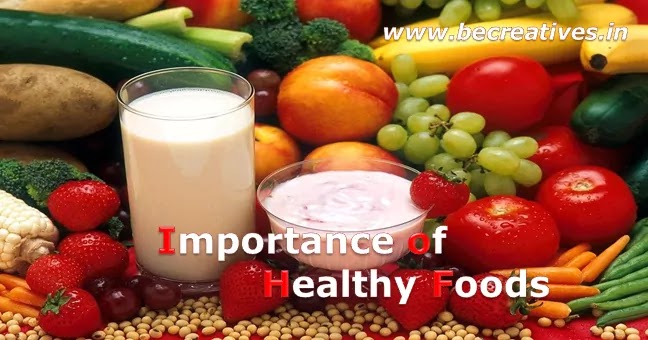
Importance of Healthy Food and Balanced Diet
Food & Diet: Food, whether solid or liquid, is vital for human survival and our emotional well-being. The right diet ensures a harmonious balance of physical, mental, emotional, and social capabilities.
Nutritional Importance: Nutrition refers to the process by which organisms extract and utilize essential elements from their diet for growth and maintenance. Proper nutrition arises from a balanced diet.
Significance of a Healthy Diet: Maintaining a nutritious diet is pivotal for overall health. It plays a crucial role in preventing chronic illnesses like obesity, heart disease, diabetes, and cancer. A wholesome diet comprises a balanced intake of nutrients and water. Foods that provide these nutrients in the right proportions are considered healthy. Consuming a well-balanced diet greatly benefits our health.
World Health Organization on Healthy Diet: The World Health Organization (WHO) emphasizes:
- Achieving energy balance and promoting healthy food choices.
- Reducing total fat intake, especially from saturated and trans fats.
- Increasing consumption of fruits, vegetables, legumes, grains, nuts, and juices.
- Moderating sugar intake and avoiding excessive consumption.
- Limiting sodium (salt) intake, preferably using iodized salt.
WHO on the Impact of Poor Diet: An estimated 2.7 million deaths annually are attributed to inadequate vegetable and fruit consumption. WHO also estimates that 19% of global deaths are due to an imbalanced diet. Heart attacks account for 31% of these deaths, and strokes for 11%, making it evident that diet plays a significant role in overall health.
Dietary Types:
1. Sattvic Diet: This diet purifies the body and brings tranquility to the mind. Foods consumed fresh, within 3-4 hours, are considered sattvic.
Examples: include fresh fruits, green vegetables, almonds, cereals, and fresh milk.
2. Rajasic Diet: This type of diet energizes the body and mind. However, excessive consumption can lead to hyperactivity, restlessness, irritability, anger, and sleep disturbances. Typically, foods that are very flavorful or intense are considered Rajasic.
Examples: Spicy foods, onions, garlic, tea, coffee, and fried foods.
3. Tamasic Diet:
Tamasic foods tend to dull the mind and body. Overindulging in these foods may cause lethargy, confusion, and disorientation. These include foods that are reheated, overly oily, overcooked, or contain artificial flavors.
Examples: Meat-based dishes, banana-heavy diets, fatty foods, oil-rich dishes, and excessively sweet meals.
In essence, our diet significantly influences our health and well-being.
As the saying goes:
"Our diet reflects our inner self."
A nourishing heart leads to a divine existence.
Food Philosophy: Our mental and physical states mirror our dietary choices. A wholesome diet nurtures both the body and mind, promoting satisfaction, health, and balance. In this context, a well-nourished mind resides in a well-nourished body.
Conclusion:The right diet fosters clear thinking, which in turn cultivates peace within families. This domestic tranquility can extend to communities and even entire nations. It's advisable to lean towards a Sattvic diet, which offers strength, health, and happiness. Ayurvedic teachings also emphasize the benefits of Sattvic foods, endorsing a diet that maintains both bodily health and mental serenity.
10 reasons why food is important
As you navigate through your day, that familiar hunger pang might hit. Every living creature needs nourishment, though the specifics differ widely. Human food choices are influenced by factors like income, cultural background, availability, and individual likes. But when you sit down for a meal or grab a snack, how often do you reflect on it? Are you aware of your food's origin? Or its significance? Here are ten reasons to ponder:
1. The Vitality of Food for Survival
Food is essential for our existence. While proteins, fats, carbs, vitamins, and minerals fuel our bodies, lack of them can lead to the body utilizing its own tissues for energy. Although direct studies on starvation pose ethical challenges, data reveals that without food, an average healthy male weighing around 154 pounds can survive between 1 to 3 months. The dire consequences of prolonged hunger strikes show the undeniable fact: food is vital.
2. The Mental Benefits of Cooking
Beyond its physical benefits, food also impacts mental health. Engaging in cooking and meal preparation can enhance confidence, concentration, and overall mood. The therapeutic nature of cooking, a creative endeavor, can be a stress-reliever and mood enhancer.
3. The Quality of Food Matters
Diet directly influences health outcomes. Foods rich in nutrients like vegetables and whole grains promote better health, reducing the risk of chronic diseases and certain cancers. A notable study from the 1990s indicated that women who shifted towards plant-based foods and reduced fatty foods had a 21% lower risk of dying from breast cancer.
4. Food: The Core of Numerous Professions
The food industry employs a significant portion of the global population. From agriculture to food supply chains, food safety to restaurant businesses, countless careers revolve around food.
5. The Complex Emotions Tied to Food
Our relationship with food is multifaceted. For many, it can be a source of stress or even trauma. Disorders like anorexia have alarmingly high mortality rates. Eating habits can significantly disrupt one's life, underscoring the importance of a balanced relationship with food.
6. The Politics of Food
Food intertwines with politics and culture. For instance, "food deserts," areas with limited access to affordable, healthy food options, are shaped by political decisions and socio-economic factors. In the U.S., racial and income disparities can determine one's proximity to these food deserts.
7. The Global Challenge of Food Insecurity
In 2020, hunger affected between 520-811 million people globally. The FAO highlights the world's struggle in ensuring food security and ending hunger, exacerbated by factors like economic slowdowns, conflicts, and the COVID-19 pandemic.
8. Climate Change's Impact on Food Production
The food-climate relationship is undeniable. With climate change, global crop yields might decrease by up to 30% by 2050, intensifying food security concerns, especially for those already vulnerable.
9. Food Chronicles Human History
Tracing the history of food provides insights into human evolution and society. For instance, while humans have consumed apples for over 10,000 years, intentional or accidental hybridizations have given us the diverse apple varieties we enjoy today. Food evolution narrates a significant part of human history.
10. Food as a Cultural Anchor
Food and culture are intricately linked. As societies evolved, their cultures were influenced by available food resources. For diasporas, traditional cooking provides a connection to their roots and becomes a cultural exchange as cuisines blend.
as we know that what is importance of food by this article so share this information to your friends also.
Another best 10 reason: food is important,why?
Food is important for many reasons, ranging from basic biological needs to complex social implications. Take a more in-depth look here:
1. Biological survival and energy
2. Growth and Cellular Repair
Proteins, which are broken down into amino acids by our digestive system, are essential for the growth and repair of tissues. This is especially important for children and teens, those who play sports, and those recovering from injuries or procedures.
3. Essential nutrients for bodily functions
Vitamins and minerals: Although present in minor levels, these micronutrients are essential for a variety of functions. For example, calcium is essential for bone health, vitamin C aids wound healing, and iron is essential for carrying oxygen in the blood.
Fats: In addition to providing energy, fats aid in the absorption of certain vitamins, comfort our organs, and are essential components of our cell membranes.
Carbohydrates are the body's major source of energy, powering everything from brain function to muscle activity.
4. Disease prevention and health maintenance
A balanced diet rich in vital nutrients can boost the immune system, reduce the risk of chronic diseases like diabetes, heart disease and high blood pressure, and even some types of cancer. Can stop.
5. Cognitive performance and mental health
It is well recognized that certain nutrients, such as omega-3 fatty acids, impact brain health and cognitive performance. A balanced diet can also help with mood swings, depression and other mental health disorders.
6. Cultural and traditional significance
Food is an important part of cultural identity. Many festivals, rituals and celebrations around the world revolve around traditional foods, fostering a sense of togetherness and identity.
7. Social Cohesion
In addition to providing food, sharing food builds community and strengthens relationships. Food draws people together, whether it's family dinners, dates, or community feasts.
8. Economic impact
The food business, which includes agriculture, processing, distribution, retail and hospitality, is a major economic force in the world, employing billions of people.
9. Sensory Pleasure
Culinary arts stimulate our senses by offering a variety of tastes, aromas and textures. Food is not only a source of nutrition, but also a source of joy, creativity and discovery.
10. Ethical and environmental choices
In recent decades there has been increased awareness of the ethical implications of food choices, particularly in terms of animal rights and environmental sustainability. Many people choose diets that reflect their ideals and concerns about the environment and its inhabitants.
In short, eating is important in many ways. It affects our physical and psychological health, social interactions, cultural identity, economic structure and moral ideals.






0 टिप्पणियाँ
please do not inter any spam link in comment box.